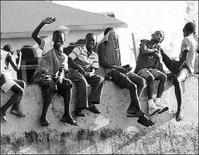Avia Collinder, Sunday Gleaner Writer
These boys hang out on the periphery of a football field. Studies have shown that young boys in Kingston's inner-city garrison communities are being trained to commit crimes and align themselves to political parties.- File
A STUDY OF 53 inner-city boys ages six to eight years suggests there is a deliberate attempt by politicians, dons, community members and parents to influence succeeding generations of underprivileged boys to fear, hate and harm persons who support the rival political party.
This is the assertion of anthropologist Dr Herbert Gayle of the University of the West Indies, Mona, who recently completed a report entitled: 'Young Birds That Know Storm: Life Experiences of Boys of Ages Six to Eight Years Living in Communities of Extreme Poverty and Violence'.
two sides of the same coin
In a related article captioned 'Infant Boys Learning to Fear, Hate and Harm; Recipe for Sustaining Tribal Political Violence in Jamaica's Garrisons', the researcher posits that political tribalism and violence in Jamaica are two sides of the same coin. He further claims that members of garrison communities are recruited by groups (gangs) at a vulnerable age to perpetuate and strengthen their power base. Garrisons are communities where one political party dominates, often through coercion.
The findings from Gayle's 2007 study - which was conducted using the participatory approach, among other methodologies - had as its subjects 'infant boys' who were divided into three main groups: aggressive/violent, moderately aggressive/moderately violent, and non-aggressive/non-violent.
To varying degrees, says Gayle, boys were observed over a period of time by their teachers and guidance counsellors displaying aggression or violence towards other children.
like to fight
In interviews, the boys also acknowledged carrying out acts of violence against others, including instigating fights constantly; intentional wounding, such as stabbing; throwing stones and bottles; hurting or 'drawing blood'; carrying lethal weapons on their person; and using a gun with the intent to harm others.
They, the anthropologist notes, also engaged in aggression involving use of the body: punching and pinching until the victim is harmed or skin is broken. The boys, the data show, also expressed a liking for fighting and harming others and stated reasons to continue doing so.
Fifteen of the 53 boys had a history of violence and were characterised as aggressive. Of this number, 13 (87 per cent) lived within the most volatile zones, characterised in the study as the heart of a garrison. One lived in an enclave, and only one on the periphery of the garrison.
Eight of the 53 boys were categorised as moderately aggressive, while 30 were considered non-aggressive. Of the moderately aggressive boys, five lived within the most volatile zones. By comparison, of the 15 non-aggressive boys, only three lived in the very volatile zones.
Gayle asserts: "The closer the boys live to the garrison headquarters, the more violent their behavioural history, which suggests that training in political tribalism affects the boys' overall relationship with their peers."
This influence, he says, was exacerbated by the absence of countersocialisation in their individual homes. The researcher notes, "Only boys who received a high level of nurture and supervision acted differently or seemed to absorb little of the donmanship training and propensity to harm persons who support the opposing political party."
impact of training
But, in a social and cultural context in which boys are routinely neglected, the training had a big impact, notes the researcher.
He points to the analysis on gender disparities by UNICEF (2007) which showed that boys in Jamaica were neglected as early as in infancy by their parents, adding that life expectancy of men raised in the garrison was much lower than the national norm.
"Males are at least four times more likely to kill or be killed in Jamaica. In some of the garrison communities involved in this study, one of nine males will never live to see age 40," the anthropologist states.
The study directly contradicts the assertions of Jamaica's two main political parties that they no longer have entrenched connections to violent, geographically centralised factions who support them.
"Politicians of the two main political parties in Jamaica (People's National Party - PNP - and the Jamaica Labour Party - JLP) constructed these communities to secure votes. About a third of all the inner-city communities of the Kingston Metropolitan Area are garrisons to varying degrees," the researcher notes.
According to Gayle, the majority (85 per cent) of the boys in the study fear persons of the opposing political party and see them as a threat to life and livelihood. This, they said, was communicated to them by their parents, peers and even politicians themselves.

